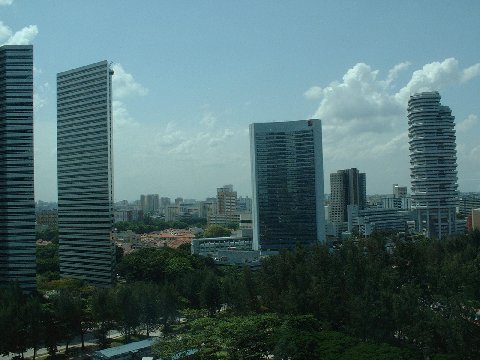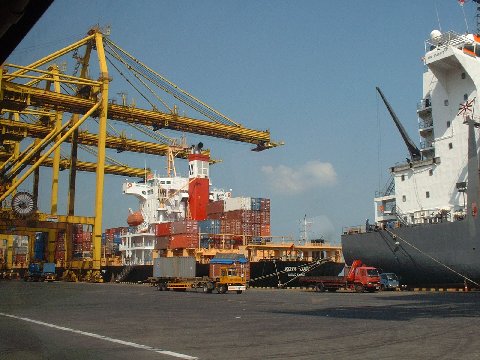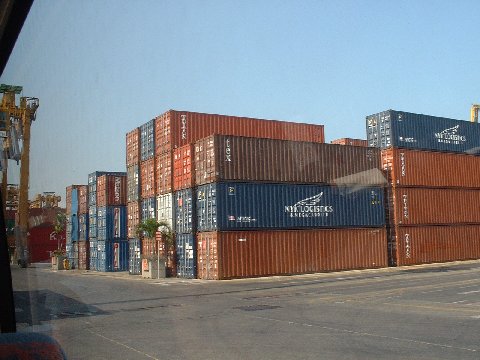Singapore is looking to change that.
From infrastructure improvements to government initiatives, Singapore is after a piece of the growing market for video games, particularly in Asia. Game development studios are leveraging Singapore's economic and regional advantages to create original content for Asia and the world. And a new generation is rising up, passionate about games and wanting to make their mark.

A view of downtown Singapore from the 14th floor of Suntec Tower Three. In this first of what I'm thinking will be 3 or 4 articles about game development in Singapore (including a lot of discussion about Asian markets in general), I take a look at Singapore's information technology infrastructure.
Infrastructure, Singapore Has It
Game development in Singapore is still at relatively early stage, but they aren't starting from scratch. Far from it.
For nearly 200 years, Singapore has been an important sea port, and that has influenced their culture in many ways. As a country, they are used to helping goods move efficiently from point A to point B, so it's only natural that they would focus on ways to translate their strength as a port into the digital space.
To that end, Singapore has become a enthusiastic protector of international intellectual property (IP) and copyrights, to allay the fears of IP licensors. Further, the Infocomm Development Authority of Singapore (IDA) has created the Digital Exchange with the goal of positioning Singapore as the "global distribution hub for the processing, management, and distribution of digital assets"--including video games.

The Port of Singapore
Singapore claims the title of the "most connected city in Asia", with fat Internet pipes to over 20 countries, including the USA, India, Korea, Japan, and China. Three-quarters of all households have PC's, and 65% of those have Internet connectivity (35% broadband). In the mobile arena, the penetration is even greater, standing at 85% of the population (not just households).
The Digital Exchange hopes to leverage this connectivity, as well as Singapore's business-friendly environment, and their established legal and financial frameworks to attract game developers and publishers who want to enter the Asian game markets.
In the same vein, IDA launched the "Games Bazaar". The Games Bazaar is billed as "scalable hosting platform" that allows game developers and publishers to test and deploy their games in Asian markets without facing high upfront costs. By utilizing Singapore as an East-meets-West crossover point, developers can try out the Asian market, using Singapore as a test bed.
In an interview, Mr. Thomas Lim, Director, Games and Entertainment, IDA Singapore, described the Asian game market as "fractured", with many very different segments: China, India, Korea, Malaysia, and more. Using the Games Bazaar, developers can find out which markets respond best to their games, and then pursue those markets. IDA will even help developers find partners to work with in those markets.

20-foot shipping containers, stacked and ready to be loaded. Imagine the Port as a digital hub, and these containers as digital assets.
Infrastructure and support services are king in Singapore, and the Game Bazaar is no exception. The Game Bazaar is not about creating games. It's about hosting them. IDA wants to partner with game developers, and wants to help them get started in the Singapore and (much) larger Asian markets. If you want to find localizing partners, or even collaboration partners, the IDA will be happy to help. But it's up to you to build the game.
The focus on infrastructure even extends to the private sector in Singapore. Teckwah, for example, is a company that has created a framework for Internet Caf?s and Game Rooms. Called Eden II (http://www.edenii.com), the product is client-side (Caf?-side) software that provides both a distribution network for games, and a turnkey setup with an additional revenue stream for the Internet Caf? owner. Since Internet Caf?s have never really caught on in the US, their primary focus is the Asia Pacific region.
Collecting payments for games and other digital media has proved a limiting factor for developers and publishers hoping to expand into Asia. While credit cards have penetrated to a significant portion of the US and European player base, the same is not true in countries like China and Malaysia. Singapore is up to the task, though, with companies like Systems@Work (http://www.sysatwork.com) offering pre-paid MasterCards. With "no minimum age, income, or bank account required", these cards open up new ways for players to pay for your game.
Asia 101
With a total population of only 4.2M (3M citizens plus 1.2M immigrant workers), Singapore isn't a large market, but it is a very diverse market, a unique mix of cultures, both East and West. And while Chinese is the main language, English, Tamil (a language from southern India), and Malay also hold official language status. People in Singapore watch many of the same movies, listen to much of the same music, and play a lot of the same games as people in the USA. Of course, they also have access to movies, music, and games from China, Japan, Korea, and India.
All of this makes Singapore a sort of "Intro to Asia" that developers can leverage, possibly turning Singapore into an Asian test market. This was talked about some already, in relation to the Games Bazaar, but this may prove to be the most important aspect of Singapore, at least to US and European game developers and publishers.
Further, as Singapore's involvement in game development grows, this cultural diversity will undoubtedly prove useful, not only in helping non-Asian game developers enter Asia, but also in creating original made-in-Singapore games that have "crossover" appeal between Asian and Western players. Look at how Hong Kong was able to create movies that appealed to audiences on both sides of the Pacific, and how those movies, and their actors and directors, have been able to influence Hollywood. That shows it's not impossible for an island to take on a media juggernaut--even if it might take a few years.
Looking for a Place in the Sun
I was fortunate enough to spend the 3rd week of June 2004 as a guest of Singapore, representing GameDev.net and the United States game development press at the combined conferences for CommunicAsia, BroadcastAsia, and EnterpriseIT. Sometimes it was a challenge to figure out the game development angle on the proceedings, but over the week one thing became more clear: Singapore is serious about games.
I was shown the impressive capabilities of Singapore's businesses (multi-national corporations and local) and government in bringing technology within easy reach of the population. For example, you have to see the Jurong Regional Library to believe it. When the government of Singapore decides that it wants to support something, it puts money where its initiatives are and gets to work. And now Singapore has its sites on video games.
More than that, I also had the chance to talk to many people who have a real passion for games and game development. Just like in the US and Europe, people in Singapore love to play video games. And that love of games translates into a desire, almost a compulsion, to make games.
While the government of Singapore currently tends to focus more on the infrastructure and being a gateway to the Asian market, the people I talked to were more interested in creating their own games, developing their own IP. After all, that's where the future is.
Up Next
My next article will profile several successful Singapore developers who are making new and unique games for PC's and mobile devices, and get their views on the growth of the game development industry in their country.
Information About
Infocomm Development Authority of Singapore
http://www.ida.gov.sg
The Game Bazaar
http://www.ida.gov.sg/idaweb/media/infopage.jsp?infopagecategory=&infopageid=I2914&versionid=3
About the Author
Two months ago, David Michael didn't even have a passport. Now he has attended and covered conferences in both Australia and Singapore in addition to his normal coverage of the Game Developer Conference for GameDev.net. David is the author of "The Indie Game Development Survival Guide" (Charles River Media; ISBN: 1584502142) and is co-owner of Samu Games (http://www.samugames.com).




